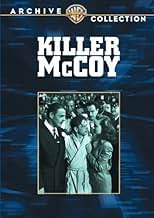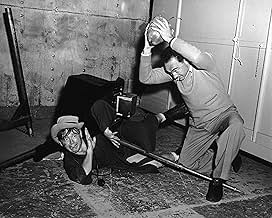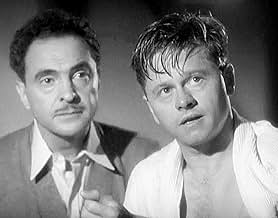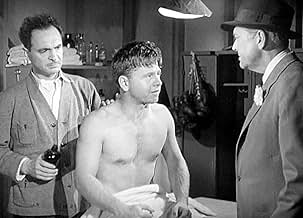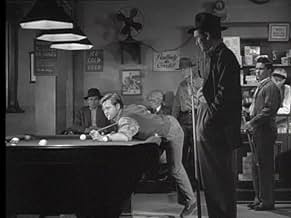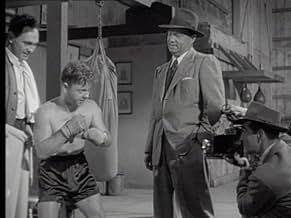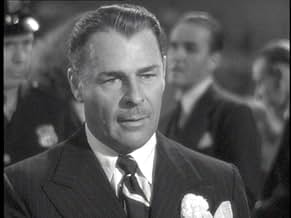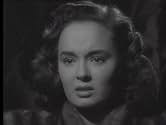Aggiungi una trama nella tua linguaFollowing a mishap in the ring, hard-nosed lightweight Tommy "Killer" McCoy gets mixed up with a big time gambler and falls for his educated daughter Sheila, against her father's better wish... Leggi tuttoFollowing a mishap in the ring, hard-nosed lightweight Tommy "Killer" McCoy gets mixed up with a big time gambler and falls for his educated daughter Sheila, against her father's better wishes.Following a mishap in the ring, hard-nosed lightweight Tommy "Killer" McCoy gets mixed up with a big time gambler and falls for his educated daughter Sheila, against her father's better wishes.
- Regia
- Sceneggiatura
- Star
- Premi
- 2 vittorie totali
- Fight Spectator
- (non citato nei titoli originali)
- Sportscaster at Ringside
- (non citato nei titoli originali)
- Fight Spectator
- (non citato nei titoli originali)
Recensioni in evidenza
MGM does a boxing movie, not exactly its usual glamorous fare. And though the movie suffers in comparison with the gritty, noirish classics of the time, Body and Soul (1947) and The Set-Up (1949), Rooney lends a kind of manic energy that remains compelling. In fact, the film's shrewdly cast, from bit parts to leads, making it easy to overlook the film's theatrical over-tones. Sure, it's a vehicle for Rooney, to toughen his Andy Hardy image, but the producers have surrounded him with a first-rate cast, and a pretty good story that's got just enough twists to carry past the many clichés.
My favorite parts are surprisingly some of the talky parts—the two gamblers Tully and Donlevy, each thinking he's outfoxing the other; or the two boxers Rooney and Steele, buddying up in the nightclub after their match; or a cynical Rooney finding out the chippie waitress does have more on her mind than casual sex. Each is cleverly written and expertly performed. I just wish Rooney had hooked himself to a generator where all that energy could have lit up a city.
No, the movie's neither memorable nor a boxing classic, but it does make it as 100-minutes of colorful entertainment.
The 27 year old Rooney couldn't play kids any more, and so MGM cast him as a young man literally fighting his way out of the slums by becoming a boxer. And he's very convincing in the role. He was always a sensitive performer, but this time he displays a maturity and a restraint that is remarkable. He is really listening and giving his all to his fellow actors, and so to the audience.
And he has some great actors to work with. The entire cast is very strong, but special mention should be made of the excellent Brian Donlevy, and, most especially the brilliant James Dunn. Playing Rooney's washed-out Vaudevillian father, Dunn is truly unforgettable - making the character both immensely likeable and totally loathsome.
Apart from the performances we also get some very nicely filmed, and exciting, boxing sequences. On the downside, the script is rather ordinary, the ending a bit sappy, and the direction unimaginative. But the film is well worth seeing for Rooney and Dunn at their best!
The local priest, as an act of charity, tells Rooney and Dunn about a need for a song and dance number to open for a fight that night with the job paying ten dollars. After the fight, Rooney says he'd like a turn at the winner, and he does manage to knock the guy out. This causes someone who sees the fight to take him under his wing and teach him the ropes of the trade. At one point down the line Rooney kills a guy with his punch and that earns him the nickname "Killer".
All the while Mickey's dad is causing problems - drinking heavily, running up big debts to gamblers that eat up the purses that Mickey wins, until his dad sells Mickey's contract to a crooked gambler (Brian Donlevy) who is living a double life that includes a daughter nobody knows about who is attending an elite finishing school (Ann Blythe). Complications ensue, not the least of which is that Rooney's father has a big mouth in the presence of the wrong people about everything that is going on.
Look fast for Shelley Winters in a non-speaking bit as one of Rooney's groupies as he trains for a championship.
What I've described sounds pretty formulaic except maybe for the crooked gambler living a double life, but it is very well done and is an excellent showcase for an adult Rooney in an adult role. He's convincingly hard boiled when he needs to be. The only thing negative I can say is how the conclusion seemed rushed - like the writers really didn't know quite how to end it.
Strangely enough, Rooney and the director of this film had a big argument on the set about how bad Rooney's acting was which caused him to walk off the set. Rooney angrily recalled the incident 50 years later when Robert Osborne interviewed him on Turner Classic Movies. Osborne sat perfectly still while Rooney ranted about the situation, later saying he was afraid Rooney would have hit him if he moved or spoke.
Rooney is trying something a little different. I love him but I don't really buy him as a boxer. He has enough muscles but he's not a good fighter. The staging is not helping. He's flailing around like a dancer. I don't buy him even outside the ring. He's no Rocky. Maybe they could play it off as his advantage. He's smarter than the usual dumb brutes who fight and he fights like a dancer. As for the drama, I would have thought that his fight with Johnny Martin should be set up as the climax. Quite frankly, he should quit fighting after the incident. It's nice to have the wife come talk to him afterwards but it's not elevating the emotional drama. It's an emotional excuse for him to continue. I love Rooney no matter what. This is one of the no matter whats.
As the ambitious young prizefighter Mickey Rooney is perfectly cast in the role. Although the role had to be taken down a few pegs in weight division, I believe Robert Taylor was a middleweight in the first film, given Rooney's size and build he's now a lightweight. But not in acting talent by any means.
As in the first film Rooney's Achilles heel is his father, a lovable drunk loafer who has a nasty habit of getting into bets involving slow horses. That puts Rooney in a vulnerable spot given his rising career as a boxer. Taking over from Frank Morgan who was great in the role in The Crowd Roars is James Dunn, equally as good.
In fact playing just such a part two years earlier had earned Dunn a Best Supporting Actor for A Tree Grows In Brooklyn. Sad to say that Dunn was playing a version of himself. At the time he was cast in A Tree Grows In Brooklyn, Dunn's drinking had rendered nearly unemployable. That Oscar gave his career a resuscitation, but Dunn would do mostly television after this role.
Rooney's love interest and also well cast as the sheltered daughter of gambler Brian Donlevy is Ann Blyth. They did work well together, too bad they didn't do a few more films. Also Sam Levene as Rooney's trainer gives a good performance as well.
Killer McCoy was a good part for Rooney. Sad to say in his next two films he was miscast and MGM dropped him. They should have given more material like Killer McCoy.
Lo sapevi?
- QuizIn an interview with Robert Osborne for Turner Classic Movies, Mickey Rooney related that he didn't get along with the director Roy Rowland. One time on the set, Rowland yelled "Cut!" and proceeded to yell at Rooney in front of the cast and crew, concluding "I'm leaving!" Rooney was so incensed that he took hold of Rowland and said "No! I'm leaving" and then went home.
- BlooperIn the seventh round of his fight against Patsy Cigones (Larry Cisneros), Tommy McCoy (Mickey Rooney) is actually held up by the referee to prevent him from falling after he takes a strong hit from his opponent. This happens after the bell at the end of the round as the referee is helping Tommy to his corner which is not unreasonable.
- Citazioni
Brian McCoy: Aw, Tommy, this'll be a lesson to me. I'll never do it again. I give you my sacred word of honor.
Tommy McCoy: This is the payoff. We signed for Dominic and we have to draw Johnny Martin. And now you have to blow a good part of the purse we haven't even got yet. I ought to let you take the rap for this.
Brian McCoy: Aw, but you wouldn't do that, your own father?
Happy: Six hundred for what? You can bury him for fifty.
- ConnessioniReferenced in Super Tramp (1989)
I più visti
- How long is Killer McCoy?Powered by Alexa
Dettagli
- Data di uscita
- Paese di origine
- Lingua
- Celebre anche come
- Killer McCoy
- Luoghi delle riprese
- Azienda produttrice
- Vedi altri crediti dell’azienda su IMDbPro
Botteghino
- Lordo Stati Uniti e Canada
- 2.000.000 USD
- Tempo di esecuzione
- 1h 44min(104 min)
- Colore
- Proporzioni
- 1.37 : 1


